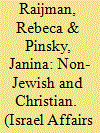| Srl | Item |
| 1 |
ID:
101639


|
|
|
|
|
| Publication |
2011.
|
| Summary/Abstract |
This paper focuses on a specific group of post-1989 Former Soviet Union (FSU) migrants in Israel, those who prefer to keep their Christian religion in a country with an explicitly Jewish character. Specifically, we focus on (1) immigrants' perceptions of state and institutional discrimination against non-Jewish immigrants, and (2) immigrants' construction of social distance and social boundaries across ethno-cultural groups. Our findings suggest that Christian immigrants challenge the hegemonic definition of who is a Jew, strongly contest the Israeli ethno-national regime of incorporation that discriminates against non-Jewish citizens, and advance claims for equal rights. Religion becomes the most important marker for identity construction. Shared national background (country of origin) does not necessarily guarantee solidarity and cordial social relations between immigrants.
|
|
|
|
|
|
|
|
|
|
|
|
|
|
|
|
| 2 |
ID:
101632


|
|
|
|
|
| Publication |
2011.
|
| Summary/Abstract |
Drawing on Israeli, German and US census data, we compare the educational levels of Jewish immigrants (and their non-Jewish family members) from the Former Soviet Union (FSU) arriving in Israel, Germany, and the US during 1990-2000. The comparison of educational levels among immigrants arriving in the three countries can be viewed as a 'natural experiment' in immigrants' destination options, whereby immigrants could choose two countries with practically no visa restriction (Israel and Germany) and one country (USA) with visa requirements. Drawing on Borjas' theory of self-selection, the paper discusses the relative attractiveness of the three countries to various types of immigrants, expecting highly educated immigrants to prefer destinations where returns on skills are higher. The findings support theoretical expectations: highly educated migrants were more likely to move to the US, where the labour market is more flexible and returns on skills are higher than in Israel or Germany.
|
|
|
|
|
|
|
|
|
|
|
|
|
|
|
|